Join More Than 50,000+ Subscribers and get latest camera news and rumors
NEW CAMERA VIDEOS ON YOUTUBE
|
By admin, on March 13th, 2023

According to the latest rumors coming out from the rumor mill, Sony is about to announce a new full-frame camera VLOGCAM Sony ZV-E1. The Camera will use the same sensor we have seen in the Sony A7S III camera, take a look at the rumored set of specs of the upcoming camera
Sony ZV-E1 Specification
- 12.1-megapixel BSI CMOS sensor
- BIONZ XR Processor
- Dedicated AI Chip
- CFexpress Type A/SD UHS-II dual slot
- ISO 80-102400 (STD)
- ISO 409600 (Exp)
- 759-point focal plane phase-detection AF (-6EV compatible F2.0 lens)
- 0.64 type 9.44 million dots OLED EVF
- 3.0 type 1.44 million dots LCD monitor
- 4K 120p 4:2:2 10bit 600Mbps (no crop)
- NP-FZ100
- Compact body design similar to Sony A7C
Sony ZV-E1 Arrival Date
- Sony ZV-E10 will arrive on March 29, 2023
Sony is geared up for announcing a professional VLOGCAM, the camera is set to be one of the most professional vlogging cameras ever launched by any camera maker to date. If we look at the entire set of specs, it looks like Sony will remake its FX3 camera into a Vlogging camera. According to the source of the rumor mill, 4k 120fps mode will become available in the summer of 2023 via a firmware update. We will post an update soon as we get any new information related to the upcoming camera
Follow us on our social pages FACEBOOK | TWITTER | INSTAGRAM, If you have time –>see more Sony Alpha Rumor
source SARwebsite
By admin, on March 10th, 2023

According to the latest rumors coming straight out from rumor mills, Sony ZV-FE100 (Rumored name) Camera on March 29, 2023.
Sony ZV-FE100 Rumored specification
- New ZV FF E-mount camera is based on the Sony As7III
- Name might be ZV-E100
- 12MP sensor
- 4k60 & 4k 120 (no crop)
- No EVF
- Cheaper than the
At this moment we have limited information regarding specs and pricing, will post an update soon as we get any.
Follow us on our social pages FACEBOOK | TWITTER | INSTAGRAM, If you have time –>see more Sony Alpha Rumor
source SARwebsite
By admin, on February 21st, 2023

According to the latest rumors, Sony will soon announce Sony ZV-FE100 full-frame Mirrorless camera for vlogging. The camera will shoot 4k 60fps video, 10 Bit internal recording, Slog3 Support, and also includes IBIS + Gyro Support. The camera announcement is expected sometime in March-April of 2023.
These are the initial set of information coming from new sources take it with a grain of salt.
Follow us on our social pages FACEBOOK | TWITTER | INSTAGRAM, If you have time –>see more Sony Alpha Rumor
source SARwebsite
By admin, on February 14th, 2023
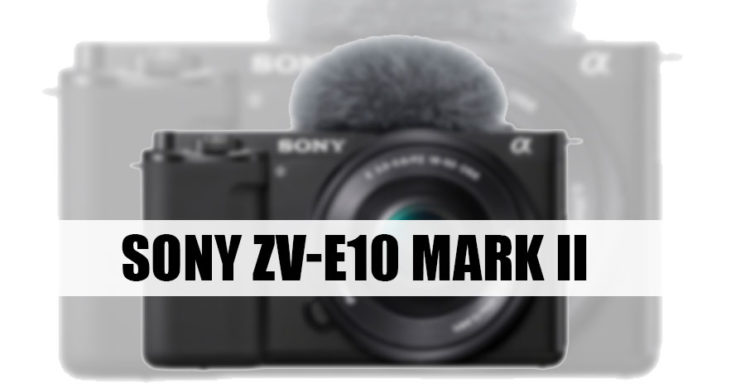
According to the latest rumors that surfaced over the web, The camera will have significant updates in the video core specs, including 4k 60fps video capability and a Sensor-Shift Image Stabilization system, with an updated interface.
Update 25 June 2023 – Sony ZV-E10
Based on the latest trend, the Peak-time selling period of the Sony ZV-E10 camera isn’t over yet. It is so popular in the market right now in Japan that it covers more than 48% of Sony’s total Alpha camera sales, according to the latest report.
Until and unless the peak period of the Sony ZV-E10 camera is over, Sony will not put out a new model to replace the ZV-E10, which is already being sold in very large quantities and is one of the most popular cameras in the market.
Now, the expected time frame for the arrival of the ZV-E10 Mark II camera successor is somewhere around Q1-Q2 of 2024
Follow us on our social pages FACEBOOK | TWITTER | INSTAGRAM, If you have time –>see more Sony Alpha Rumor
By admin, on February 9th, 2023
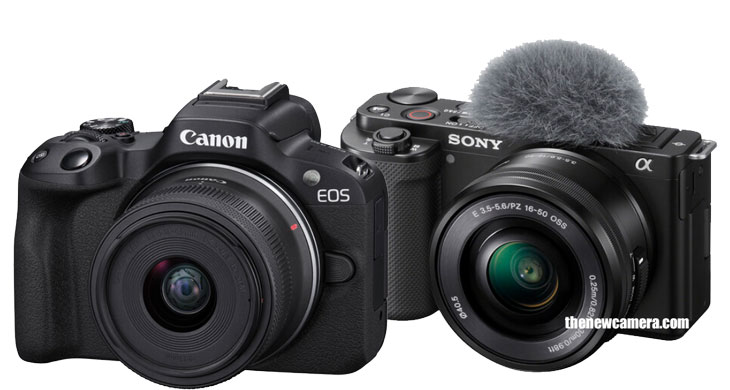
Let’s talk about the body design of both the camera the Canon R50 camera is more photographer friendly with the EVF and the deep hand grip that is missing in the Sony ZV-E10 camera
As you can clearly see Canon R50 and Sony ZV-E10 have different design approaches, Canon R50 has a more traditional, like a DSLR camera with a deep handgrip and also EVF for daylight shooting, while the Sony ZV-E10 may have a more modern, bit more compactish design that looks more vlogger friendly. Ultimately, the best camera for you will depend on your specific needs, shooting style, and set of available lenses (Open lens mount or close etc )
If you are a photographer and looking for a camera that has a more photographer-friendly design, it’s better to look up the Nikon z50 or maybe the Sony A6400.
But we have to also remember that the Canon RF mount supports a limited amount of lenses since it’s a closed mount and in Sony, we have an amazing range of lenses starting from the affordable to the g master series and the Sony lens amount of Sony is open from 2011. so literally, you have to be very conscious before making your decision
Get Canon R50 From Amazon.com | B&H Store
Get Sony ZV-E10 Camera from Amazon.com | B&H Store
| Lens Mount |
Canon RF |
Sony E |
| Sensor Resolution |
Effective: 24.2 Megapixel |
Actual: 25 Megapixel
Effective: 24.2 Megapixel (6000 x 4000) |
| Sensor Type |
22.3 x 14.9 mm (APS-C) CMOS |
23.5 x 15.6 mm (APS-C) CMOS |
| Crop Factor |
1.6x |
1.5x |
| Image Stabilization |
None (Video)
|
Digital (Gyro Based) |
| Built-In ND Filter |
None |
None |
| Capture Type |
Stills & Video |
Stills & Video |
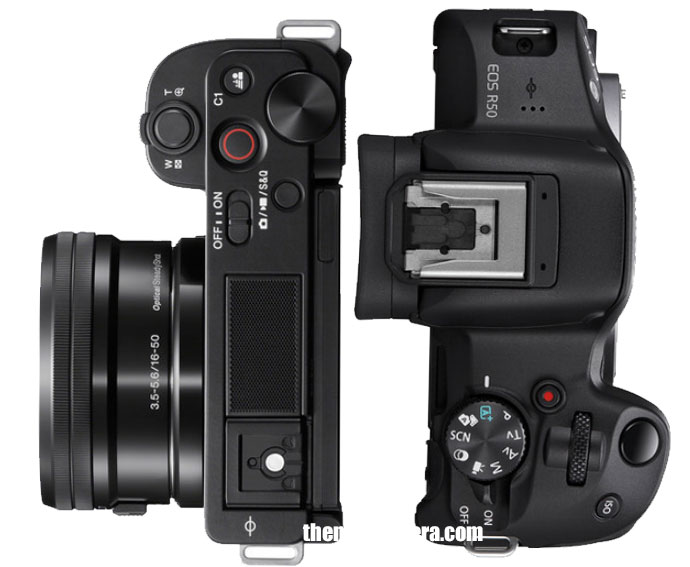
After the body design let’s compare the internal core specification of both cameras.
The Canon R50 camera features the same 24-megapixel sensor that we have seen in the Canon R10 camera, and also here the Sony ZV-E10 camera uses 24MP sensor, which we have seen in the Sony 6400 camera or A6600 camera.
| Shutter Type |
Electronic Shutter |
Electronic Shutter, Mechanical Focal Plane Shutter |
| Shutter Speed |
Electronic Shutter
1/8000 Up to 30 Seconds
Electronic Front Curtain Shutter
1/4000 Up to 30 Seconds |
Mechanical Shutter
1/4000 to 30 Seconds
1/4000 to 1/4 Second in Movie Mode |
| Bulb/Time Mode |
Bulb Mode, Time Mode |
Bulb Mode |
| ISO Sensitivity |
Photo/Video
100 to 32,000 (Extended: 51,200) |
Photo
100 to 32,000 in Auto Mode (Extended: 50 to 51,200)
Video
100 to 3200 |
| Metering Method |
Center-Weighted Average, Evaluative, Partial, Spot |
Center-Weighted Average, Multi-Zone, Spot |
| Exposure Modes |
Aperture Priority, Manual, Program, Shutter Priority |
Aperture Priority, Auto, Manual, Program, Shutter Priority |
| Exposure Compensation |
-3 to +3 EV (1/3 EV Steps) |
-5 to +5 EV (1/3, 1/2 EV Steps) |
| Metering Range |
-2 to 20 EV |
-2 to 20 EV |
| White Balance |
Presets: Auto, Cloudy, Color Temperature, Custom, Daylight, Flash, Fluorescent (White), Shade, Tungsten |
Presets: Auto, Cloudy, Color Temperature Filter, Custom, Daylight, Flash, Fluorescent (Cool White), Fluorescent (Day White), Fluorescent (Daylight), Fluorescent (Warm White), Incandescent, Shade, Underwater |
| Continuous Shooting |
Electronic Shutter
Up to 15 fps for up to 28 Frames (JPEG) / 7 Frames (Raw)
Electronic Shutter
Up to 12 fps for up to 42 Frames (JPEG) / 7 Frames (Raw) |
Up to 11 fps at 24.2 MP for up to 116 Frames (JPEG) / 46 Frames (Raw) |
| Interval Recording |
Yes |
Yes |
| Self-Timer |
2/10-Second Delay |
2/5/10-Second Delay |
AutoFocus Performancee
As you can see the number of AF points in Canon R50 is 4503 DPAF points for stills and 3713 DPAF points for Video. And when we compare it with the Sony’s ZV-E10 425 Hybrid AF points the comparison look meaningful less for a moment, but its not about how many numbers of AF points a camera has or fabricated inside it, the key factor of todays Mirrorless AF system in the Artificial Intelligent Algorithms inside the camera, and that’s the biggest reason why despite of having less number of AF points the AF performance of The Sony ZV-E10 is flawless.
| Focus Type |
Auto and Manual Focus |
Auto and Manual Focus |
| Focus Mode |
Continuous-Servo AF, Manual Focus, Single-Servo AF |
Automatic, Continuous-Servo AF, Direct Manual Focus, Manual Focus, Single-Servo AF |
| Autofocus Points |
Photo
Phase Detection: 4503
Video
Phase Detection: 3713 |
Phase Detection: 425
Contrast Detection: 425 |
|
|
-3 to +20 EV |
Canon R10 – Fastest Shooting Entry-level camera
For the first time Canon has introduced an electronic shutter inside an Entry level body, now with the help of an electronic setter we are able Burst upto 15FPSbut, but sadly the buffer is limited to 30 Frames of JPEG, so you can hardly have two second buffer slot with the Canon R50 Camera.
Sony ZV-E10 camera has a limited Brust speed of 11 frames per second, but at the same time the buffer memory of Sony’s ZV-E10 camera is much more than that of the Canon R50, with the ZV-E10 camera you are able to record 116 frames of JPEG in a single Brust and 46 frames of RAW0
Since Canon R50 camera uses a Canon R10 camera sensor and the samples of Canon R5 isn’t available right now, that’s why we are keeping the R10 image samples in our comparison list, so you can have an idea how will R50 will perform against the Sony ZV-E10
BASE ISO TEST

In the base are you so test you can clearly see both cameras are performing equally well, the detail capturing ability of both the camera is good at the base ISO range.
HIGH ISO TEST

Now let’s talk about the HIGH ISO TEST of both the camera, As now you can see the Sony ZV-E10 camera is able to preserve slightly more details in some specific situations compared to the Canon R50 Mirrorless camera, so for low light purposes of course Nikon ZV-E10 is bit more helpful.
Video Specs
| Internal Recording Modes |
H.264/H.265/MPEG-4
UHD 4K (3840 x 2160) at 23.98/25/29.97 fps
1920 x 1080 at 23.98/25/29.97/50/59.94/100/120 fps |
H.264/H.265/MPEG-4
UHD 4K (3840 x 2160) at 23.98/25/29.97 fps
1920 x 1080 at 23.98/25/29.97/50/59.94/100/120 fps |
| Broadcast Output |
NTSC/PAL |
NTSC/PAL |
| Built-In Microphone Type |
Stereo |
Stereo |

Best Entry-Level Camera to Record Videos?
Both cameras share exactly the same video Resolution and frame rates, Canon R50 camera as well as the Sony’s ZV-E10 camera records 4K videos up to 30 FPS and full HD videos up to 120 per second. So, for the first time, we have a Canon entry-level model that doesn’t crop in 4K. Undoubtedly it will bring smiles in face of Canon users, those who are waiting to upgrade their cameras from Canon M50 Mark ii or Canon 200D Mark II / SL3 . But, at the same time in 3rd generation of making APS-C Mirrorless cameras, the ZV-E10 is more video oriented and focuses on content creator requirements.
None of the cameras have any time recording limit in 4K 24 and 30 FPS recording video, but yes you have to carry extra battery packs says the batteries dry out quickly with these entry-level cameras when you are recording 4K.
Canon features DIGITAL Image stabilization mode in VIDEO, which we see generally in entry-level cameras, the mode works but with a cost of crop and it becomes unbearable and painful to your hands when you try to vlog with the Canon 18-45 kit lens, the 18mm wide generates a 24mm equivalent focal length of a full-frame camera and after that, once you apply Digital IS Mode, you hardly adjust yourself in the frame. So, if you want to vlog with an R50 camera, better to buy the Canon’s 15-30mm Lens OR at least an RF 16mm F2.8 Lens. But, unfortunately, the RF 16mm lens doesn’t have OIS Support. To better get the 15-30mm lens for vlogging if possible. As you know, we don’t have many options with Canon since the lens mount is locked and we have to select from a limited range of lenses.
Best lenses for Sony ZV-E10
But, the biggest surprise is we have a gyro image stabilization system inside the Sony ZV-E10 which works very effectively when you are shooting videos with the camera. Although using Gyro-based data is not that easy, either you have to use the catalyst browse software to stabilize your footage prior to editing, or Sony now also offers Catalyst plugin for premier pro software.
The range of available lenses is much more than you would expect, The Best Sony ZV-E10 Lens for Vlogging in 2023 is Sony 11mm F1.8 Lens, The lens captures a super wide 16mm full-frame equivalent look and a BRIGHT F1.8 aperture perfect for vlogging.
The Sony ZV-E10 also features a 3-capsule-based enhanced internal microphone design that captures audio much better than you would expect from a regular entry-level camera, as well as to monitor that audio you also get an extra 3.5mm headphone port. Which is not available with the Canon R50.
Of course, a Range of dedicated modes is also there which includes face exposure priority, product showcase, and skin softening mode for vloggers.
Interface
| Media/Memory Card Slot |
Single Slot: SD/SDHC/SDXC |
Single Slot: SD/SDHC/SDXC/Memory Stick Duo Hybrid (UHS-I) |
| Video I/O |
1 x Micro-HDMI Output |
1 x Micro-HDMI Output |
| Audio I/O |
1 x 1/8″ / 3.5 mm TRS Stereo Microphone Input on Camera Body |
1 x 1/8″ / 3.5 mm TRS Stereo Headphone Output
1 x 1/8″ / 3.5 mm TRS Stereo Microphone Input |
| Other I/O |
1 x USB-C Input/Output |
1 x USB-C Input/Output |
| Wireless |
2.4 / 5 GHz Bluetooth 4.2 Control |
1 x USB-C (USB 3.2 / 3.1 Gen 1) Input/Output (Shared with Power Input) |
| Mobile App Compatible |
Yes
*As of February, 2023: Check with manufacturer for the most up-to-date compatibility |
Wi-Fi, Bluetooth |
| Global Positioning (GPS, GLONASS, etc.) |
None |
None |
Best Camera for shooting Still Images and video?
Canon R50 overall design is more appealing to photographers since the camera also features EVF and a better handgrip, we also have an advanced AF system with AI AF object tracking mode and faster burst speed it looks ver impressive. But, at the same time you can see from the results of the High ISO Test, the Sony ZV-E10 sensor is preserving more details, if u want a more video-oriented camera with features like an advance microphone, dual 3.5mm jack, gyro-based IS, and product showcase mode, ZV-E10 best for you.
The Next BIG thing is Canon’s Locked lens mount. So, the range of lenses for an entry-level shooter is less (if you have a limited-budget lens ).
So, overall it depends upon who is buying the camera if he/she is a casual shooter. Not interested in having extra lenses and love the R50 design, then yes for you guys the R50 is best. But for those who are more serious with photography or video at the same time they have a limited budget, better to buy a Sony ZV-E10 camera (or A6400 is you are a photographer).
Get Canon R50 From Amazon.com | B&H Store
Get Sony ZV-E10 Camera from Amazon.com | B&H Store
By admin, on January 20th, 2023

After the latest firmware update of the FX3 camera, users could not find the old Slog2 option in the menu. But, why this happened? The reason is very simple, the Slog 2 is limited to 8bit and Sony is no more interested in keeping the old recording 8bity format inside their camera.
Sony Slog 2 vs Slog 3
See, we have to understand this, S-LOG2 and S-LOG3 are both color spaces developed by Sony for use in their camera systems. But, S-LOG2 is the previous generation of the color profile and has some limitations,
- One of the main differences is the dynamic range that each color space can capture. S-LOG3 has a dynamic range of approximately 14 stops, which is wider than S-LOG2 which has a dynamic range of approximately 12 stops. This wider dynamic range allows for greater flexibility when grading and editing footage. Additionally, S-LOG3 has improved color accuracy and less noise in the shadows, which makes it a better option for professional videographers and photographers looking for the highest image quality.
- Another Major difference between the two is the bit depth. S-LOG2 is an 8-bit color space, while S-LOG3 is a 10-bit color space.
- S-LOG2 also has a gamma curve of 2.4, while S-LOG3 has a gamma curve of 2.8. A higher gamma curve like 2.8 of S-LOG3 allows for more room to work with in the highlights and shadows, less chance of clipping, more tonal gradations and subtle color variations, more precise representation of the scene’s brightness, and more control over the final look of the image or footage.
Latest Genrations of Slog 3
The first Sony camera to feature S-LOG3 was the Sony Alpha 7S II. It was announced in September 2015, but you also have to note that the Sony A7S II was using the first generation of Slog3, after that, we have two major updates over the original one and those are S-LOG3C, and S-LOG3G.
So, the S-LOG3C (sometimes written as SG3C ) is an updated version of S-LOG3, it’s a color space that is used in consumer cameras, a wider color gamut than S-LOG3 and it also includes a color matrix that is optimized for consumer cameras. The S-LOG3G is the latest version of S-LOG3, it’s a color space that is used in professional cameras and it’s been optimized for 8k resolution and high-frame-rate recording.
Sony FX3 Latest Fimrware Update
Before installing the update, please note and check the following:
Precautions when updating from Ver. 2.00 and Ver. 2.01
Updating to version 2.02 will delete the LUT (Look-Up Table) settings in the camera. Re-register the LUT settings after the update is complete.
Precautions when updating from Ver. 1.01 or earlier
- After updating to Ver. 2.00 or later, the camera settings will be reset to the default values.
Note: Since this update adds functions and makes major specification changes, the camera settings will be initialized as part of the update process. It is recommended that you make note of all the camera settings before proceeding. Even if you have saved the settings using the various save features available (such as Save/Load Settings and Save/Load FTP Settings) the settings before Ver. 1.01 cannot be read by the camera after the upgrade to Ver. 2.00 or later.
- With the addition of the log shooting mode, the picture profiles were reviewed and the gamma setting S-Log2 is no longer included. After the update, you will need to use the gamma setting S-Log3.
- You will be able to connect to the Imaging Edge Mobile app more easily. After pairing the app with the camera, you can transfer images and shoot remotely just by operating the app. Refer to Pairing the camera with a smartphone (Smartphone Regist.) in the Help Guide for detail. Along with this, the NFC one-touch connection function used up to Ver. 1.01 of the camera will no longer be available.
Note: You will also need to update the Imaging Edge Mobile app to Ver. 7.7 or later, and register as a new camera after the update.
Click here to download the update
Get Sony FX3 Camera from Amazon.com | B&H Store
Best Lenses for Sony FX3 – Sony 20-70 F4 | Sigma 85mm F1.4 ART
By admin, on January 10th, 2023
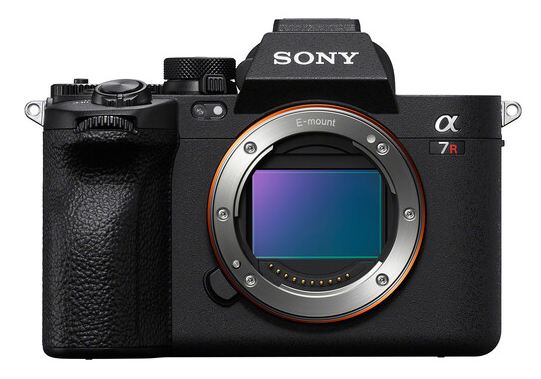
Sony A7R V camera image quality compared to Canon R5. Take a look at the image quality test between both cameras. Let’s do two HIGH ISO tests first then we will compare the details-capturing ability, its clearly visible that the Canon R5 is able to preserve more details compares to the Sony A7R V. We know that a professional will never use ISO 51200 in their camera. We are using such a high ISO range to show up the difference between the two.
So, from an initial set of comparison of the images of the two we can say that the Canon R5 camera is more recommended for uncontrolled light environments.
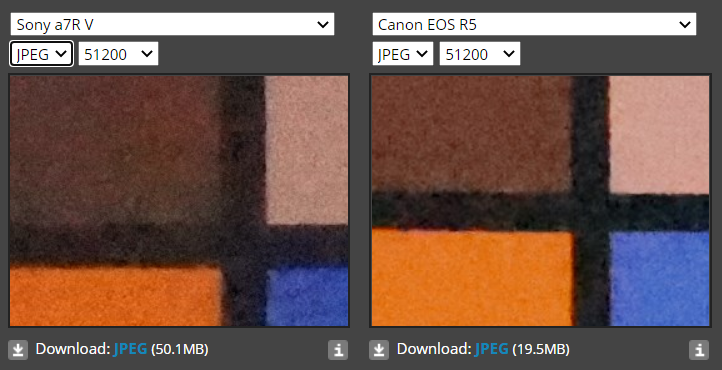
Sony A7R V is able to grab more details at base ISO, but the difference is only visible when viewed at 100%. The difference is quite logical since the Canon R5 camera features a 45MP Full-Frame CMOS Sensor and the Sony A7R 5 camera uses 61MP Full-Frame Exmor R BSI CMOS Sensor. So, here we are witnessing the difference in the details capturing ability of both cameras.
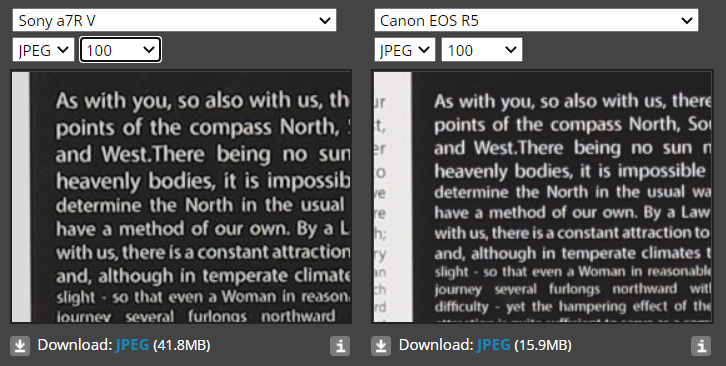
Sony A7R V Pixel shift mode 240.8MP
When you will use the Pixel shift mode 240.8MP, of ur Sony A7R V camera, you get an enormous amount of details . As you can see in the image below. The file size is also incredible jpeg is approx 150MB and the RAW is approx 1 GB.
Who Will use this mode?
If you are a studiographer or working with lights, then undoubtedly the Sony A7 R V is an amazing option for you.
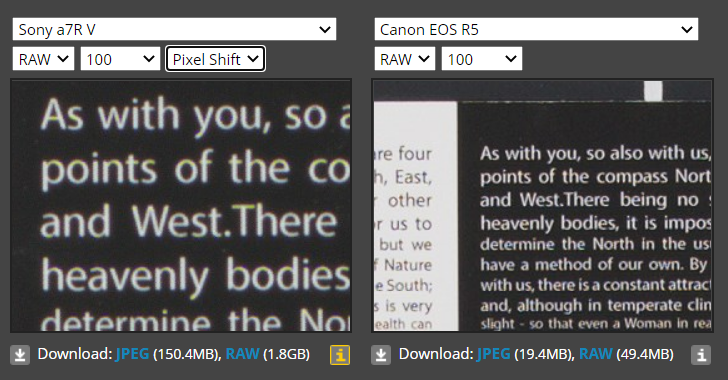
Best Camera for Photographers
If you are into Wildlife and sports then you should get the Canon R5 Camera. Since as you know the Sony A7R V is limited to 10FPS mode at the same time the Sony third-party lenses are also limited to a 15FPS limit. So, if you are into sports and wildlife then the only option is Canon R5 (yes Canon RF mount is locked, but the Canon old L Series DSLR lenses support burst speed up to 30 to 4 Fps.)
Feeling of ecstasy with A7R V possible
If you are not connected to Sports and Wildlife. The most recommended camera will satisfy pixel craving and if you use the pixel shift mode then the result will give you goosebumps and u will feel a state of complete ecstasy within yourself. That’s the most perfect camera sony ever created for pixel peepers like us.
Get ur A7R V Amazon Sony A7R V | B&H Store
Also, see – Top 10 Best Sony Cameras of 2022
Follow us on our social pages FACEBOOK | TWITTER | INSTAGRAM, If you have time –>see more Sony Alpha Rumor
Source and Special thanks to dpreview lab
|
KEEP THIS BLOG ALIVE - Support New Camera Buy Canon Lenses, Buy Music CD or Digital Camera at amazon it helps this site, and you do not pay anything extra, it is just a way to help support this site.

|
















